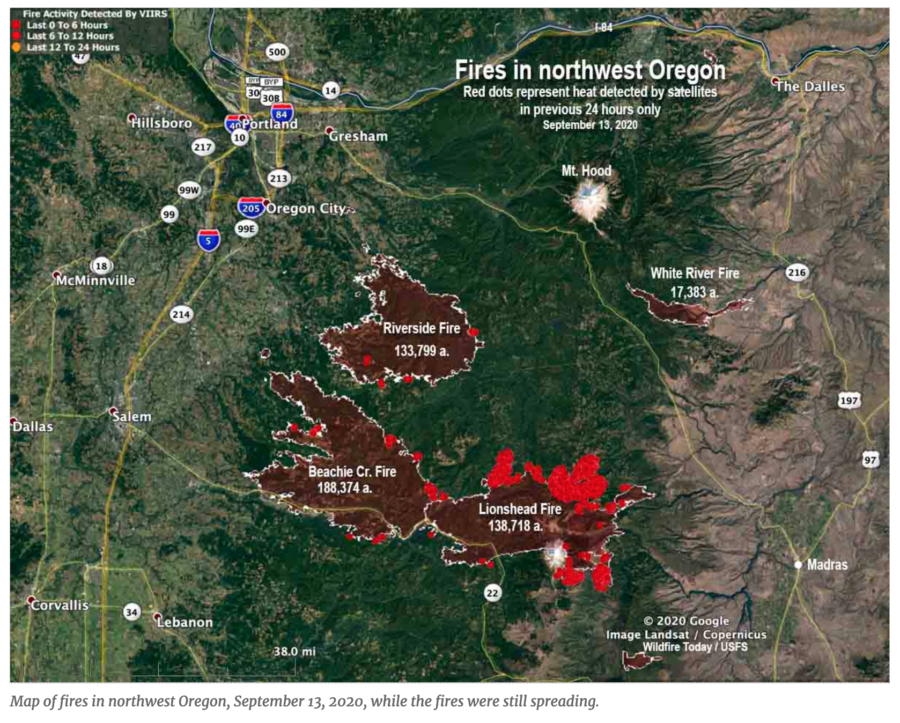PacifiCorp is requesting that customers pay its $90 million wildfire liability
In a filing last week with the Oregon Public Utility Commission, PacifiCorp requested that it be allowed to defer its liability debt and add those costs to customer rates in the future, according to a report by Oregon Public Broadcasting (OPB).
In the historic legal decision, a Multnomah County Circuit Court jury found PacifiCorp liable for around $90 million in damages to western Oregon residents who lost homes and property in wildfires started by powerlines after the utility company failed to shut down power despite multiple warnings about severe windstorms over the 2020 Labor Day holiday.
“The deferred accounting application enables PacifiCorp to preserve its ability to seek wildfire cost recovery in the future in the event the outcome could potentially impact the financial stability of the Company, which would result in higher costs to customers,” attorneys for PacifiCorp wrote.
“Pacificorp executives fail to act, and cause multiple fires that burn homes and special places across Oregon,” responded Ralph Bloemers, director of Fire Safe Communities for Green Oregon. “Based on eyewitness evidence, a jury found them grossly negligent and in reckless disregard of community safety. Apparently they want to keep paying dividends to their corporate shareholders while Oregonians pick up the tab. Will the Public Utility Commission be a toothless lapdog, or will it look out for Oregon’s best interests?”
On June 14 jurors found PacifiCorp must pay punitive damages that could amount to billions of dollars in the Echo Mountain Complex, Santiam Canyon, South Obenchain, and 242 fires. PacifiCorp said it was disappointed with the jury’s decision and that it plans to appeal.
The Labor Day fires were among the worst natural disasters in Oregon’s history. They killed nine people, burned more than 1,875 square miles (4,856 square kilometers) and destroyed upwards of 5,000 homes and other structures.
 In 2019 California’s largest utility, Pacific Gas & Electric, went bankrupt after it paid out billions in lawsuits related to the deadly wildfires it caused.
In 2019 California’s largest utility, Pacific Gas & Electric, went bankrupt after it paid out billions in lawsuits related to the deadly wildfires it caused.
In recent years, PG&E powerlines and faulty or maintenance-deferred equipment set off 31 wildfires that leveled entire towns and killed 113 people.
In 2020 PG&E pleaded guilty to more than 80 counts of manslaughter for its role in the 2018 Camp Fire, which destroyed the northern California town of Paradise.
Utilities, especially in the U.S. West, are finally finding themselves in a financial bind — mostly of their own making. An Associated Press report published by KPTV News noted that updating, replacing, and even burying thousands of miles of powerlines is a time-consuming and expensive undertaking. But the utilities’ failure to do or even start that work in earnest years ago has put them at risk as wildfires have grown more destructive — and lawsuits over electrical equipment igniting wildfires have ballooned.

In Oregon the PUC is responsible for rate regulation of investor-owned electric utilities (Portland General Electric, Pacific Power, and Idaho Power), natural gas utilities (Avista, Cascade Natural, and NW Natural), landline phone service providers, and some water companies.
Because utilities produce profits for investors from customers, they often raise revenue for infrastructure upgrades by hiking rates. PG&E’s bankruptcy settlement with California wildfire victims totaled $13.5 billion. But only half that money was paid to victims in cash — the other half was paid out in PG&E stock, and that stock has since declined in value.
Oregon’s Citizens’ Utility Board, a nonprofit that advocates for utility customers at the state level, called it “outrageous” that PacifiCorp wants to pass its legal costs on to Oregonians.
“Customers pay the costs of prudent, reasonable, utility operations,” said Bob Jenks, the CUB executive director. “The court found that Pacific Power was reckless and grossly negligent, and included punitive damages meant to punish the company, not customers. Customers should not pay a dime of these costs.”
The state PUC would need to approve this request before PacifiCorp could defer the wildfire liability costs. The Citizens’ Utility Board said it intends to fight that approval. The final verdict in the class-action lawsuit is posted on our DOCUMENTS page.

Stockholders skate. P/E is BS!
Maybe utilities outfit start hiring more staff foresters to either walk or fly assessing powerlines and start fining zoning and developers for punching in communities in the WUI willy nilly and put more teeth in the Firewise program through……ahem…tougher legislation. But, we have “legislation” by way of insurance companies reaching into our pocketbooks because industry and government have shown too slow a progress in the WUI problem
Maybe the penalty should be charged to the decision makers PERSONALLY?
Ooooh Big Surprise here!!
NOT!
JimS, Maybe they could dip into their profits? In 2022 alone their net income was $920 million.
On top of all the previous comments, input, etc., the executives of these companies keep making their 6 figure salaries, etc., while the infrastructures slowly crumble, fail, and devastation.
Of course the money is going to come from rates. Where else would it come from? Cut maintenance? Sell infrastructure? Layoffs? The magic money tree? End user pays all, ALWAYS. Whether it’s something like this or alleged business taxes. There’s no such a thing as a business tax. End user pays all.
People also forget these utility companies are mandated to do a jillion other things other than maintain their infrastructure. These other things take away from their primary mission and they become more susceptible to this sort of thing. Rates have to go up or something else has to give.
I think it’s time that PUBLIC utilities return to being PUBLIC property, not cash cows for corporations which didn’t pay for the dams, original lines, or other infrastructure. This includes hospitals!